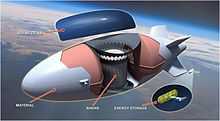Integrated Sensor is Structure

The Integrated Sensor is Structure, sometimes called Integrated Sensor is the Structure, (ISIS), is a program managed by the United States Air Force (USAF) to research the feasibility of using an unmanned airship as a high-altitude aerial reconnaissance and surveillance platform. The program, as of March 2009, is directed by the United States Air Force Research Laboratory.
As currently proposed, the 450-foot (140 m)-long surveillance airship could be launched from the US and stationed for up to 10 years at an altitude of 65,000 feet (20,000 m) above the target area. The airship would be equipped with state of the art Active electronically scanned array radar, integrated into the structure of the airship, to observe the movement of vehicles, aircraft, and people below. At that altitude, the airship would be beyond the range of most surface-to-air and air-to-air missiles. The airship would be filled with helium and powered, at least in part, by solar-powered hydrogen fuel cells. The radar system as proposed would have a range of 373 miles (600 km).
The USAF has signed an agreement with DARPA to develop a small demonstration prototype by 2014. Past work on the project was done by Northrop Grumman and Lockheed Martin. The USAF announced on March 12, 2009 that it had budgeted $400 million for work on the project.
In April 2009 DARPA awarded a $399.9 million contract to Lockheed Martin as the systems integrator and Raytheon as the radar developer for phase three of ISIS. Under the contract, Lockheed will lead the construction of a one-third scale model of a blimp featuring Raytheon's new, low-power density radar system. The goal of the ISIS program is provide radar capable of delivering persistent, wide-area surveillance tracking and engagement of air targets within a 600-kilometer area and ground targets within a 300-mile (480 km) area, according to DARPA. The blimp will have a radar about 7,176 square yards (6,000 square meters) in size to be tested at an altitude of 6 miles (9.7 km) above the ground. The contract awarded $100 million initially to the two companies, with the rest to follow in phases with a completion date of March 2013.[1]
See also
- TCOM Blue Devil
- High-altitude airship
- Buoyancy compensator (aviation)
References
Notes
Lockheed Martin magazine (Code One) Volume 24 Number 3 2009
www.washingtontechnology.com
- ↑ Ratnam
Web
- Barnes, Julian E. (March 13, 2009). "Pentagon Plans Blimp To Spy From New Heights" (Newspaper article). Los Angeles Times. Retrieved 16 March 2009.
- DARPA (April 27, 2009). "Integrated Sensor is the Structure". Program overview slide presentation.
- Ratnam, Gopal (April 27, 2009). "Lockheed Gets $399.9 Million Pentagon Order For Blimp". Bloomberg L.P. Retrieved 28 April 2009.
- Singer, Jeremy (August 9, 2006). "Pentagon’s airship plans are up in the air". MSNBC. Retrieved 16 March 2009.